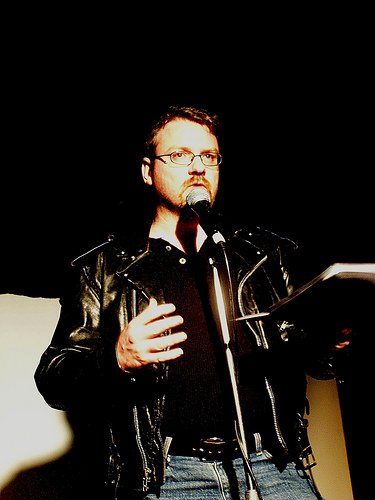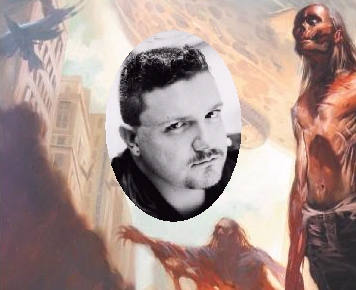
My friend Thomas S. Roche started publishing fiction nearly 20 years ago, and he’s written hundreds of crime, fantasy, and horror short stories. Back in 1999 he’d even shown me the manuscript for a great unpublished action novel — but he’s finally published his first novel for real. (Or at least, the first novel under his own name!)
It’s a zombie apocalypse thriller called The Panama Laugh. But nearly a decade earlier, before the Kindle was even invented, I’d already started thinking of Thomas as “my professional fiction-writing friend”. So I’m thrilled to be able to finally interview him about what he thinks of the self-publishing revolution, the Kindle, and e-books in general — and of course, his new zombie thriller, The Panama Laugh.
Q: For a while, Amazon was automatically adding their standard link at the left side of your book’s page that shouts “Tell the Publisher! I’d like to read this book on Kindle…” I’ve always wanted to ask an author how you feel about that. (Their next sentence is “Don’t have a Kindle? Get your Kindle here, or download a FREE Kindle Reading App…”)
THOMAS S. ROCHE: Oh, I think that’s just typical Amazon marketing — for a while they weren’t just trying to win readers; they were trying to convince publishers to publish in e-book format. I think that battle has been won.
With its Kindle marketing, Amazon committed a brilliant coup. It handled the press like it was an army of well-trained Chihuahuas. Amazon did this because it knew that it could control the e-book market in ways that it could never control the print market. By putting out press releases about how many e-books they’d sold, they augmented the public perception that “everyone is doing it.” The result is that more people tried e-books….people who might not have tried e-books, otherwise.
I don’t believe this derives from any fundamental shift in technology that enabled the Kindle… that is, the e-ink. In other words, I don’t think the e-ink technology helped, other than providing a series of talking points: “It looks just like a book! It seems just like paper! You can read it in direct sunlight!” All of which, combined with the widespread perception that e-books were becoming more common, convinced people that e-readers were worth trying.
Q: Okay, but I’ll admit that once I tried e-books, I absolutely loved them. (And I’m not the only one!) So what do you personally think about the brand new craze for “virtual” books that can be downloaded into digital readers?
THOMAS S. ROCHE: As I found when I started reading e-books on the Palm Pilot in about 2000, the advantages of e-books are enormous. There’s something really nice about settling down with a big fat paperback or a gorgeous hardcover, and e-books are never going to take that away. But there’s also a huge advantage to having a hundred or a thousand books in your pocket…being able to get virtually any public domain work in English for free in about 10 seconds with a wireless connection… being able to buy books about organized crime in Indonesia for $10, when a year ago it would have taken me six weeks to get it through inter-library loan, or cost me $100. I’m never going to give up books, but e-books have vastly enriched my reading experience!
Q: Here’s what I consider the million-dollar “what-if.” All the Kindle bloggers are buzzing about a former insurance executive named John Locke, who became the first self-published author to sell one million e-books in Amazon’s Kindle store. (And he then, just recently, landed a contract with Simon & Schuster for his “Donovan Creed” novels.) Is this opening the door to wonderful changes in the world of reading, when any voice with a personal story to tell can skip past the gatekeepers at the publishing-house? Or are we losing something precious, which more experienced authors like yourself can fully appreciate?
TSR: I honestly have no idea… I’ve read some self-published works that were absolutely amazing. I’ve read lots more works from mainstream publishers that were wretchedly, indescribably terrible, like nightmares turned into words, and not in a good way. Many of these works that I considered awful were hugely successful, not just with readers but with the reviews establishment… So I don’t know that I see much of a difference happening.
I think the “gatekeeping” has been hugely upset by the advent of e-books, but it already was being upset by the advent of the web. What made a huge difference is that now it’s easier for a writer to produce a revenue stream, even in small amounts, without the support of a publisher. But everything’s changing every day.
Q: I can feel that everything’s changing — but what changes, exactly, are you seeing today?
TSR: I think the huge advantage of e-books, with fiction, is the potential profitability not so much of self-published work, but of work published by small houses staffed by people who genuinely love the hell out of a genre. I don’t know that a self-publishing writer is necessarily the best judge of his or her best work. But a fanatic who may have no professional credentials or credits, but just loves writing in a particular genre, may be able to start a small no-budget publisher to share work they love, and that’s awesome.
Q: Speaking of publishers, your book The Panama Laugh came out in a Kindle edition and a print version. So who exactly decides if a book available in an e-book — you or the publisher?
TSR: I don’t think that today a publisher would buy print rights without buying e-book rights, unless they were a small publisher specializing in limited editions, or buying non-exclusive rights for some reason. I could be wrong, but I think they’re all acquiring e-book rights as a matter of course.
This is a new development, however — even two or three years ago, some publishers didn’t acquire e-book rights. I don’t think a publisher worth a damn would put the money into acquiring, editing and marketing a book without making it available as an e-book nowadays — unless they’re a specialty publisher, doing limited editions, collectibles, that sort of thing. In which case they would likely be looking for non-exclusive rights, or doing reprints.
Q: You’re someone who’s actually had a publishing career before the big rise in e-books. So does that change the way you felt about e-books and the Kindle in general?
TSR: I don’t think having a publishing career before the advent of e-books really changed the way I feel about them; I always approached them more as a reader than as a writer.
As a writer, though, the huge advantage of wider adoption of e-books is that publishers pay higher royalties for e-books. Self-publishing enterprises are far more likely to make money without the print costs. That makes a huge difference, and every little dollar helps. The higher royalties associated with e-books make niche publishing far more feasible, so that, for instance, a reliable and prolific genre novelist with just 1,000 or so dedicated fans can now have a viable career, even without the support of a publisher…
I think the big potential problem for all self-publishing fiction writers with e-books is over-self-promotion. I feel like we have to hit and hit and hit and hit and bleat and scream and howl to be heard above the fray. It’s exhausting, and it means that the writers who aren’t spending the time writing, or learning to write, are more likely to get found by consumers.
That’s the main disadvantage of not having a publisher — having to do it all yourself, so you spend time learning skills that take away from your writing.
Q: I’ve already asked how you feel about e-books in general — but are your feelings any different now that you’re making a big push on your new zombie novel?
TSR: I just want people to read my book — or, if they don’t like my book, then they should read something they do like. Either way, I think the act of reading book-length fiction and nonfiction is a profoundly transformative, enriching and educational act. So I want people to find the platform that works for them, and use it! If that’s e-books, I’m all over that!
I will never stop loving having a hard copy in my hand, but e-books are wonderful for a host of other reasons…
